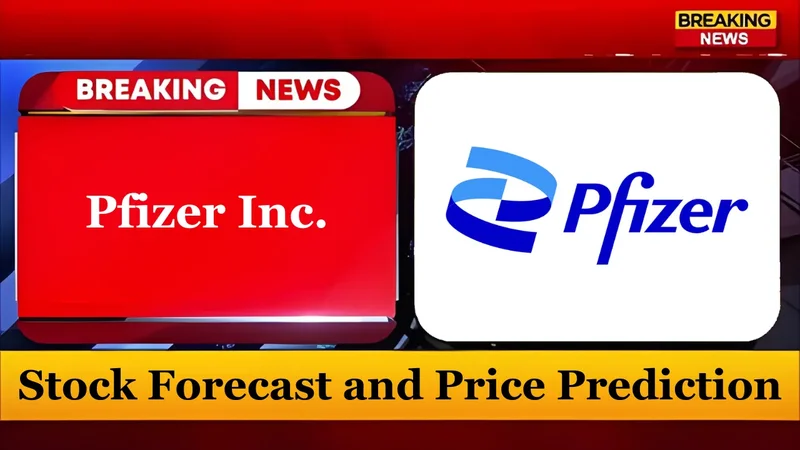Let's get one thing straight: Pfizer has been the stock market’s resident punching bag for years. A lumbering giant whose biggest claim to fame post-COVID was how fast it could burn through investor cash. The stock chart looks like a ski slope I wouldn't wish on my worst enemy. And now, all of a sudden, Wall Street is acting like Pfizer just discovered the cure for aging.
Give me a break.
In the span of a few weeks, Pfizer went from being a "value trap" — that’s finance-bro speak for "cheap for a damn good reason" — to the comeback kid. The stock popped 15% out of nowhere. The narrative shifted on a dime. Why? Because the company pulled off two massive, headline-grabbing stunts: a backroom deal with the Trump administration and a multi-billion-dollar Hail Mary into the weight-loss drug lottery.
This isn't a brilliant turnaround story. It's a company with its back against the wall, throwing money and political favors at its problems, hoping something sticks. And we're all just supposed to applaud the effort? I don't buy it. Not for a second.
The Great White House Handshake
First, let's talk about the "landmark agreement" with the Trump administration. On the surface, it sounds fantastic. Pfizer agrees to cut some drug prices for Medicaid, and in return, the White House scraps the threat of crippling 100% import tariffs. The market cheered, calling it a "win-win" that removes "political risk."
Sure, it's a win for the present. It’s like telling a guy on a sinking ship that you’ve patched one of the ten holes. For now. Pfizer’s CEO, Albert Bourla, stood at the White House and talked about securing "certainty." Certainty? He struck a deal with the most unpredictable administration in modern history and calls it certainty. That’s not just optimistic; it’s borderline delusional.
This "TrumpRx" deal is a temporary truce, not a peace treaty. It kicks the can down the road for a few years, but what happens after that? Does anyone seriously believe this policy is set in stone? Political winds shift, and a deal built on a handshake with one president can be vaporized by the next. Pfizer didn't solve its pricing problem; it just bought itself some time. It's a political band-aid, and I have to wonder if the long-term cost of cozying up to this administration will be higher than any tariff. It's a PR minefield waiting to happen, and for what? A short-term stock bump. Should You Buy Pfizer Stock Before Nov. 4?

Then again, maybe I'm the crazy one. Maybe tying your company’s fate to the whims of Washington politics is the new 4D chess of corporate strategy. But it feels more like betting your retirement on a single spin of the roulette wheel.
Chasing the Skinny Shot Gold Rush
If the political deal was a defensive move, the $7.3 billion acquisition of Metsera is Pfizer’s big, flashy, desperate offensive play. The company is crashing the party in the hottest market in pharma: obesity drugs. Novo Nordisk and Eli Lilly are practically printing money with Ozempic and Zepbound, and Pfizer, after fumbling its own in-house drug, decided to buy its way back into the game.
This is the equivalent of a classic rock band that hasn’t had a hit since 1985 suddenly announcing they’re dropping a K-pop album. They see the screaming fans and the mountains of cash, but do they have any idea what they're doing? Pfizer is late. No, "late" doesn't cover it—they’re showing up to a party that’s already in full swing, where the popular kids have already claimed the best spots.
The Kool-Aid drinkers on Wall Street are calling Pfizer a "budget entry-point" to the weight-loss bonanza. A "bargain." It’s a bargain because the market has zero faith that Pfizer can actually pull this off. Metsera’s drugs are still in mid-stage trials. Best-case scenario, they hit the market in 2026 or 2027, by which time Lilly and Novo will have an even tighter stranglehold on the market. What's Pfizer's secret weapon to compete? A slightly different dosing schedule? Fewer side effects? Maybe. But that ain't a guarantee for a blockbuster.
They're betting billions on the hope that their horse can not only finish the race but somehow beat the two champions who are already halfway to the finish line. It's a wild gamble fueled by FOMO. Offcourse, if it pays off, the upside is huge. But if it fails, Pfizer just blew another $7 billion trying to chase a trend instead of creating one. And with their track record, which way would you bet?
The whole thing smacks of a company that has lost its innovative edge. Instead of developing the next big thing from within, they're just writing enormous checks to patch the holes in their pipeline left by expiring patents on drugs like Eliquis. You can only buy growth for so long before you have to, you know, actually create it. I’m just not convinced this is the move that proves they still know how. They’ve got a massive oncology pipeline from the Seagen acquisition showing real promise, but all anyone wants to talk about is this weight-loss Hail Mary... which tells you everything you need to know about market hype.
Same Old Pfizer, New Shiny Toys
So here we are, with Pfizer’s stock looking healthier than it has in ages, all thanks to a flimsy political deal and a lottery ticket of an acquisition. Don't get me wrong, that 7% dividend is tempting. It’s a fat paycheck just for waiting around to see what happens. But these two big moves don't fix the fundamental problem: Pfizer is a battleship trying to maneuver like a speedboat in a rapidly changing ocean. These headlines are a distraction, a sugar high for a stock that’s been sick for years. The real test comes when the hype fades and everyone remembers they’re still holding a ticket for the same old ride.



